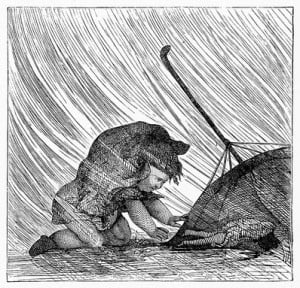Over fifty percent of the many spankings I received as a child were because of feelings, emotions, or as my parents called it “attitude”. Initially I thought that emotions in general were bad, but as time went on I realized that the fact was that children’s emotions did not matter in my home. My parents could feel angry or tired or sad and no one spanked them, but children were not allowed to have feelings.
As an adult, I now realize that telling someone not to feel is as ridiculous as telling them not to be hungry. I still feel all of the emotions I felt as a child, only now I am expected to communicate them for the first time. I often find myself in denial of my emotions, fortunately I have a husband who no longer believes me when I angrily protest “I’m not angry!”
Emotions can be scary when you don’t know how to recognize them and handle them. Adults are often uncomfortable with their children having what we perceive to be “negative” emotions because we want our children to be happy, and when they aren’t we take it personally. But being a good parent does not mean our children will be happy one hundred percent of the time, that would be unrealistic. Feelings are a part of life, and if you think about it, there really are no negative emotions. We don’t speak of body parts as positive or negative, such as a positive arm or a negative leg. Why do we label the emotions we are uncomfortable with as negative? Emotions themselves are not the issue, although how we handle them can cause problems. Even emotions that are perceived as “positive” can be handled badly, such as being so happy over winning a game that you begin to gloat and boast and rub it in the losers face. Feelings themselves are neutral, and our children need to know that it is completely acceptable for them to feel all of their feelings.
And yet, how often do we instinctively discount our children’s emotions? We say things like “Quit crying, big boys don’t carry on like that.” Is it really true that men shouldn’t cry?
Or how about “Don’t be angry”, how do you just decide not to be angry without processing that emotion?
Many times we feel the need to fix the problem. We can’t see the owie, so they are not really hurt right? We tell them “You’re OK”. Are they really? Would they be upset if they were OK?
Or maybe we are watching a movie and they are scared when something mundane happens. How often is our instinctive response a “reassuring” “That’s not scary.” Why not help them acknowledge their fear and talk about it?
We can’t “fix” their feelings, they will either be felt or suppressed. We can teach our kids to recognize and understand their emotions, and even give them acceptable ways to handle those feelings.
A great start is to recognize your own feelings and model good ways to handle them. Your kids are watching, if you handle your anger by throwing things and swearing, they will try it too. If you handle sadness by eating junk food, your children will think that is an acceptable coping mechanism. My instinct (after initial denial of the emotion) is to blame it on someone. So I will say things like “You are making me angry!” My husband will remind me to re-state it as an expression of MY feelings, not what someone else is or isn’t doing. It’s better to use “I-statements” such as “I am sad right now” or “I am so angry because…”
Recognizing our children’s feelings can start at a young age by giving them the names for their emotions. When my one year old comes running to me crying and rubbing her head, I say things like “Did you bump your head? Ouch that hurts!” If she is babbling angrily and pointing at a sibling I can help her understand what she is feeling by saying things like “You are angry because she took the toy, lets go ask her to give it back.” I have been amazed by how she is completely diffused when her feelings are recognized. She knows that I understand the problem, and that I am there to help her. She is also learning the names for those feelings.
Personally, the 18 month-3 year old phase drives me crazy. This is the age where they know exactly what they want, and are determined to get it. But they aren’t quite able to communicate clearly or negotiate or even handle disappointment well. Still, I’ve found that recognizing their emotions goes a long way! Helpful communication can be explanations such as, “You are disappointed because you wanted to wear shoes. I’m sorry, but we have to wear boots today.” Or “You are angry because you don’t want to sit in your car seat. I’m sorry, but the rule is that we have to stay in our car seats when we are in the car, so we can be safe.” Saying these things gives her the names for the emotions she is experiencing, and sometimes the explanation will make sense to her. Ms Drama has always been high sensory, so sometimes hugs or excessive attention make her even angrier when she is very emotional. She sometimes needs a bit of time alone with a stuffed animal or a book.
My 4 year old is getting to the point where she can tell me her feelings with some accuracy. She will come to me and say things like “I’m sad, I need a hug.” Or at church “I’m afraid of that boy because he was chasing me.” She’s also getting to the point where I can offer her some help with problem solving, “Are you upset because your friend won’t share? I’m sorry that happened. I’m glad you are being gentle with your friend. What do you think we should do now?” The blame game of tattling on someone’s behaviour, is changing into an explanation of her own feelings about the conflict, and figuring out how to resolve the problem instead of waiting for me to fix it.
Another great benefit of recognizing and talking about emotions, is the empathy it fosters. When someone gets hurt my children immediately ask if the person is OK and give that person a hug or pat their arm. At the end of a long pregnant day when I sat on the couch in tears, Ms Action came over to me and asked me if I was tired as she stroked my hair for me. I am so grateful for the compassion and empathy my children offer everyone around them.
I know when I began my journey into gentle parenting, I found much of this very irritating. this stuff was silly and irrelevant. I needed a real solution for problem behaviours, I needed a tool that actually worked! Communication? Recognizing feelings? Come on! I know my kids already. It has taken me a year of practice to get to the point where it is becoming instinctive to recognize my children’s feelings instead of seeing them as something bad, and to my surprise I’ve found that a lot of the “need” for punishment was eliminated when I stopped seeing feelings as a “bad attitude” problem that I was obligated to train out of my children.

















